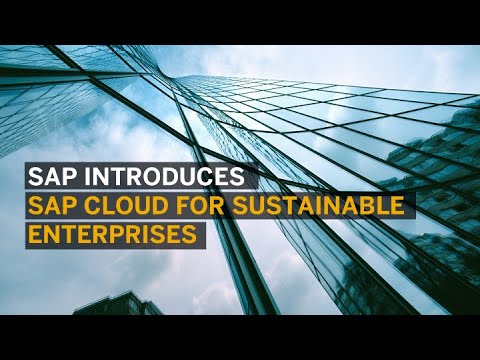Sustainability is a team sport. No company or organization can do it alone. A vibrant ecosystem is the best approach to enable us all to achieve our sustainability goals.
That is why we’re working with technology companies, leading non-governmental organizations (NGOs), management consulting firms, global systems integrators, sustainability ratings platforms, and standards-setting organizations to understand sustainability business needs and build solutions to support them.
Through these efforts, SAP is proud to enable many visionary customers, including: Unilever, which is innovating the global food system; Hitachi, which is scaling the power of renewable energy; Colgate, which is investing to reduce waste; and Anglian Water, which is rapidly implementing a holistic sustainable business strategy.

Beyond supporting our customers, we are strengthening our own sustainability commitments. We’ve announced that we will accelerate our goal to achieve net-zero emissions across our value chain by 2030, rather than 2050 — achieving our net-zero target 20 years earlier than we originally planned. Our chief sustainability officer explains how we’ve been able to make this commitment. We are also proud to be recognized on the prestigious CDP A list, which names a select group of companies leading the way to a more sustainable future, and to have earned the top ranking in the S&P Dow Jones Sustainability Indices (DJSI) in the software sector for the 15th consecutive year.
There is no question that accelerated business action toward sustainability will have a dramatic positive impact on people and the planet. At SAP, we believe it is also the greatest economic opportunity of our time. Viewing sustainability as an added cost to business is incorrect; it is a competitive advantage.
We also understand that business must be both profitable and sustainable. This means putting people, the planet, and profit on equal footing — making the “green line” as important as the top line and the bottom line. Companies that focus on sustainable business performance will gain competitive efficiencies, more easily comply with increasing regulation, and ultimately be able to adapt and thrive through new business opportunities.
Five Actions for Sustainable Business
We have learned a great deal through years of focus, investment, and experience working with customers and managing our own sustainability efforts. Urgent action is needed in 2022 and the calls of a “code red for humanity” are not overstated. It’s time for every business to act.
Since there is no such thing as sustainability in a silo, we’re sharing what we have learned. This week we’re releasing a guide outlining Five Actions for Sustainable Business.
The five actions apply to companies of all sizes, industries, geographies, and stages of becoming a sustainable business. This guide is intended to bind strategy to execution, offering a clear road map to a more sustainable future. If every company took these five actions, we would take major steps forward to enable businesses, industries, and economies to deliver the positive outcomes we urgently need.
1. Establish a Sustainable Business Strategy
Ensure sustainability is central to your overall business strategy with all corporate functions contributing. Measure your progress and report your annual sustainability outcomes at the same level of importance as your financials.
2. Embed Sustainable Business Data into Processes and Networks
Use sustainability data within your business processes to make sustainable and profitable decisions and measure performance. Then share the sustainability performance data — which could include calculated carbon emissions, water use, recyclability, or labor information — with your suppliers, industry associations, regulators, and NGOs.
3. Manage Carbon and Climate Exposure Throughout the Business
Reduce your financial and reputational risks by accounting for and managing climate-related emissions across all parts of your value chain, down to the individual product and service level.
4. Embrace Circularity and Become Regenerative
Use operating principles to avoid, reduce, reuse, recycle, and reclaim materials to minimize waste and accelerate your adoption of circular economy processes. Go beyond doing “less bad” to adopt approaches to do “more good.”
5. Prioritize People Across Your Value Chain
Enhance your social sustainability by respecting your workforce diversity, safety, and human rights, developing learning and growth opportunities, and leveraging the power of your corporate purchasing.
It is important to note the key element that powers all five of these steps: data. The saying “you can’t manage what you can’t measure” applies to revenue, profits, and sustainability. Yet our SAP Insights research shows that 79% of companies report being dissatisfied with the quality of the data they collect about environmental sustainability. The World Economic Forum reports just nine percent of companies actively use software that supports data collection, analysis, and reporting on environmental, social, and governance (ESG) actions.
To facilitate better use of data, today SAP is announcing a new cloud offering to power any organization’s sustainability goals.
Introducing SAP Cloud for Sustainable Enterprises
For 50 years, companies have turned to SAP to measure, manage, and optimize their top- and bottom-line business outcomes. Today, we are adding the ability to measure sustainability outcomes and bring clarity to their green line.
To manage the green line, companies need business process technology to identify, quantify, analyze, and act on data through their end-to-end operations. To enable this, our new offering, SAP Cloud for Sustainable Enterprises, brings together a comprehensive portfolio of solutions that enables businesses to holistically manage sustainability performance.
While the solution is comprehensive, the approach is simple: one customizable cloud offering, one license, with expert implementation support from SAP and our highly skilled partner ecosystem.
Whether you want to deliver on your net-zero sustainability goal, achieve compliance with sustainability regulations, reclaim waste materials, or empower a more diverse workforce, SAP Cloud for Sustainable Enterprises provides the technology solution to power your outcomes.
Julia White is chief marketing and solutions officer and a member of the Executive Board of SAP SE.



